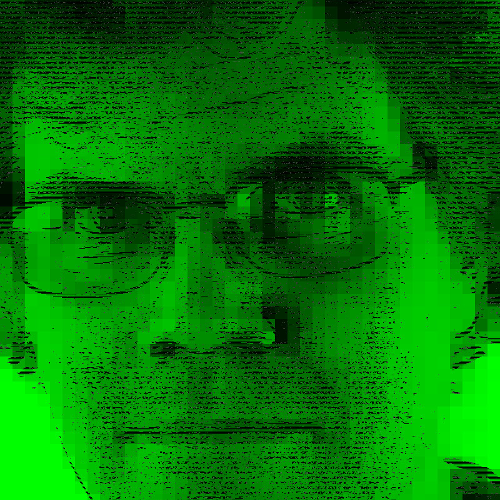A couple of things I saw in #SanFrancisco's Fishmerman's Wharf this morning:
- There's a building missing. I guess one of the wharf places was beyond renovation and needed a tear-down and construction.
- The statue Desert Shark by Peter Hazel. This piece must have seemed pretty
ironic, like (ahem) a fish out of water, in its original venue the Nevada desert Burning Man festival.
Here on the San Francisco waterfront, it loses that "oomph" of irony. It's hard to think of a less-ironic place to put it. Maybe
across the bay in the town of Tiburon I guess?
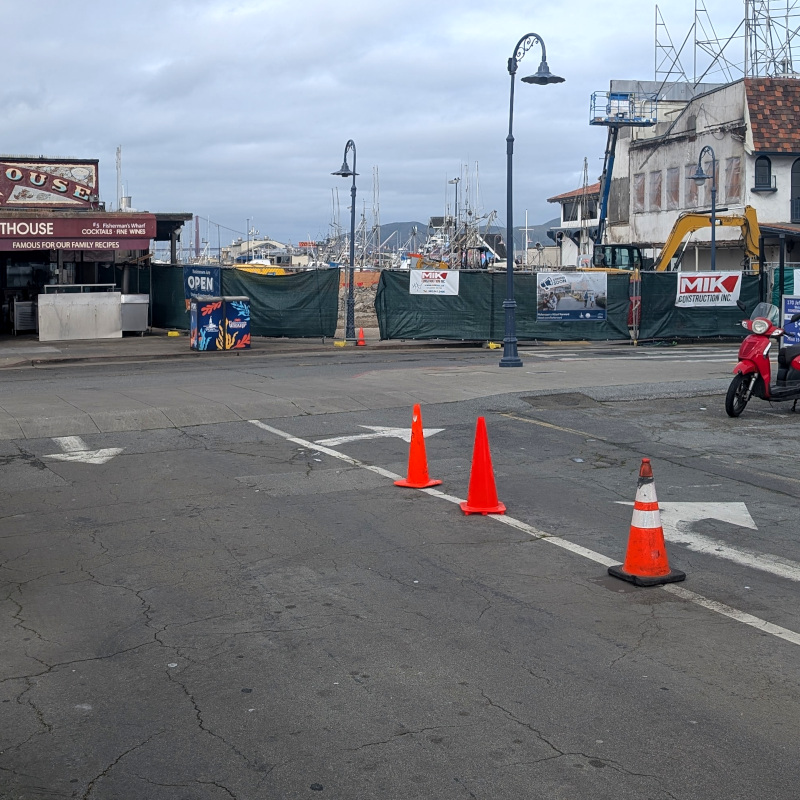
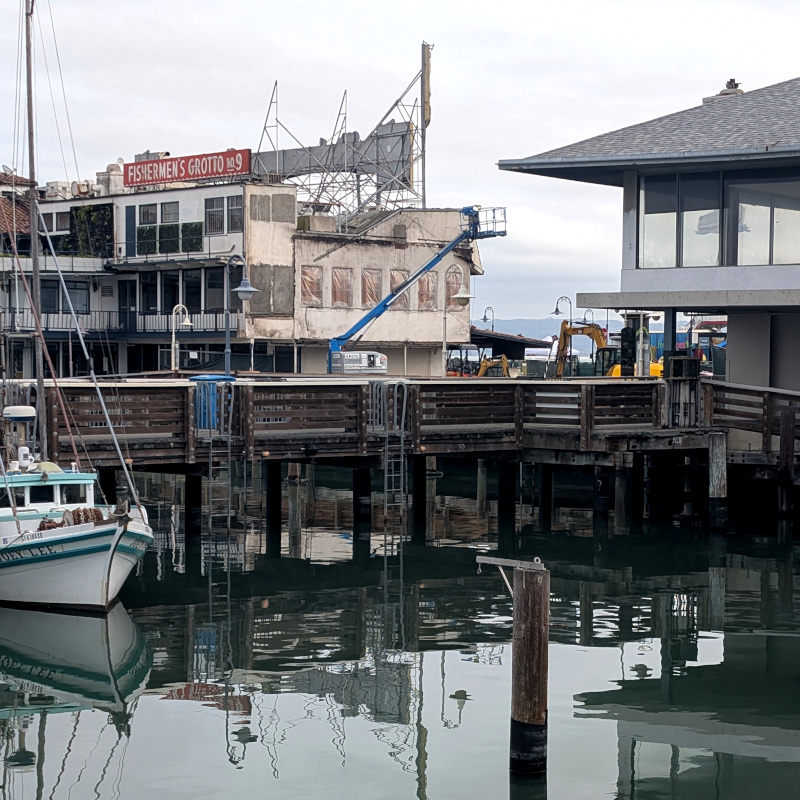
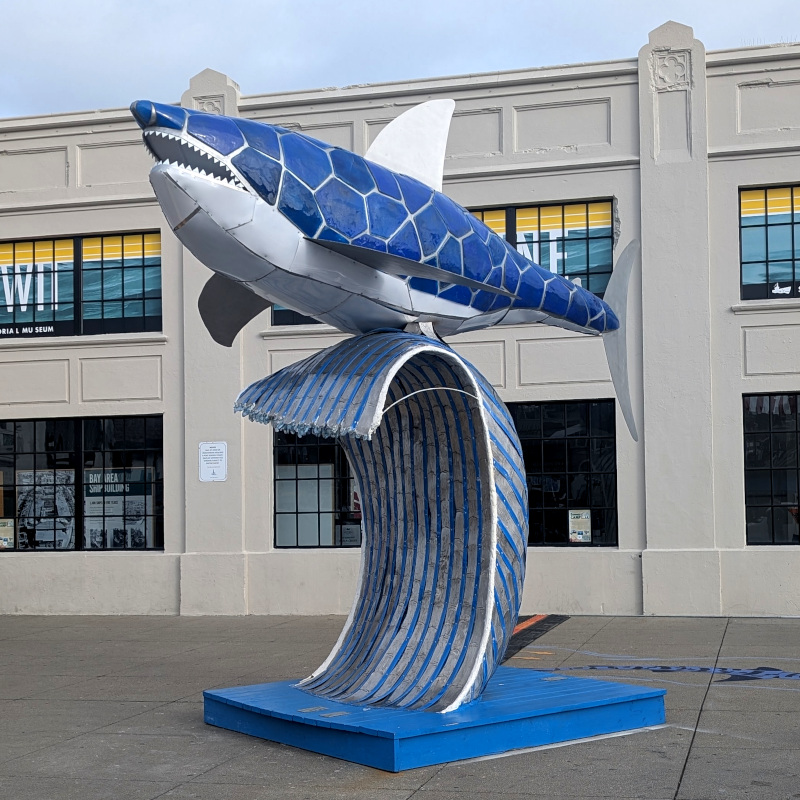
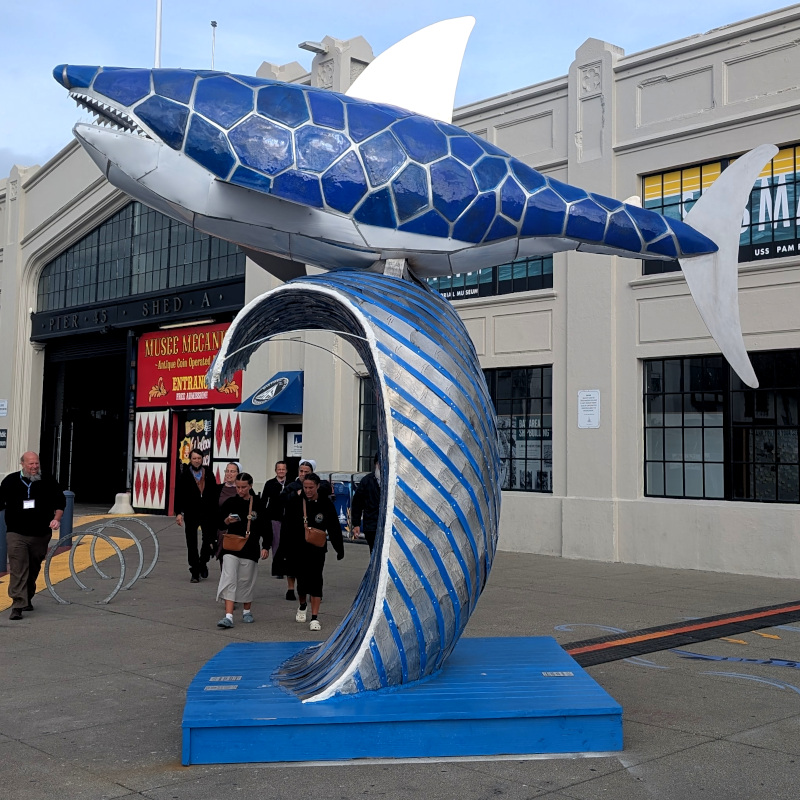
Permalink
2026-02-14T20:59:04.964211
Yesterday, the Super Bowl took place in Santa Clara, a few towns south.
A bunch of reporters and pundits stayed in #SanFrancisco and
my socials were peppered with screen shots of various people from around the USA discovering that
that SF is not a knee-deep-in-💩 hellscape, despite Trump's tweets to the contrary.
"We were so surprised by what we were told and expected versus when we walked through the streets."
Good. SF ain't perfect, but it's nowhere near as bad as you might think if you believed right-wing pundits.
This morning, I walked downtown. I do that every couple of months, when I donate blood. You're not
supposed to exercise for a few hours after donating, so I get my daily exercise by walking to the blood
donation place.
Along my route, there are a few blocks on Market near the Tenderloin that normally each have
several people suffering: probably
unhoused, probably addicted to some bad drugs. This morning was different, though.
This morning, there was maybe a handful of such folks,
total. I'm pretty sure a bunch of these people were swept under the proverbial rug for the weekend
so that we'd present a pretty picture for the influx of visitors, especially influence-y reporter-ish
visitors.
Anyhow, don't believe the dystopic tweets. But maybe don't believe your lying eyes, at least not this
past weekend. It's not normally like this.
Permalink
2026-02-09T22:22:08.148687
I continue to check my little dashboard of #SanFrancisco COVID numbers each morning to
decide whether to go get professionally made coffee at my local Peet's or make so-so coffee at home. As you may recall, I track three numbers:
number of positive (i.e. sick) tests; % positive tests; and COVID detected in wastewater. A couple of weeks ago, the
COVID-in-wastewater number zoomed up sharply. It was so sharp, I assumed it was just a momentary blip (wastewater numbers are noisy),
but it stuck around. The last time I blogged
about these numbers, it was because all three were at "pretty safe" levels. This time, I'm blogging to note that they're not all pretty-safe.
I'll still go out for coffee,* though. The COVID-in-wastewater isn't super high, and the PCR test levels are still low.
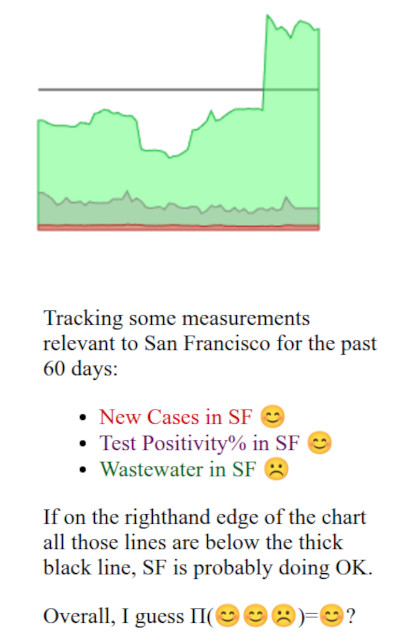
I dunno why the COVID-in-wastewater went up so much. I just saw an article about how recent improvements at the Southeast Treatment Plant helped it smell better, I thought maybe someone moved a sensor after they re-opened that part of the plant. But now that I double-check, I see that work happened a few months ago. So, uh, 🤷
*Joke's on me: The new Peet's corporate closed my local shop. I guess I'll make my own coffee at home after all.
Permalink
2026-02-06T17:48:00.662813
The Storybook House at Masonic Ave/Upper Terrace has their Valentine's Day decorations up. One word: 💕♥️ Hearts! 💖💗
The place across the street also has decorations up. More than one word, I guess.
#SanFrancisco
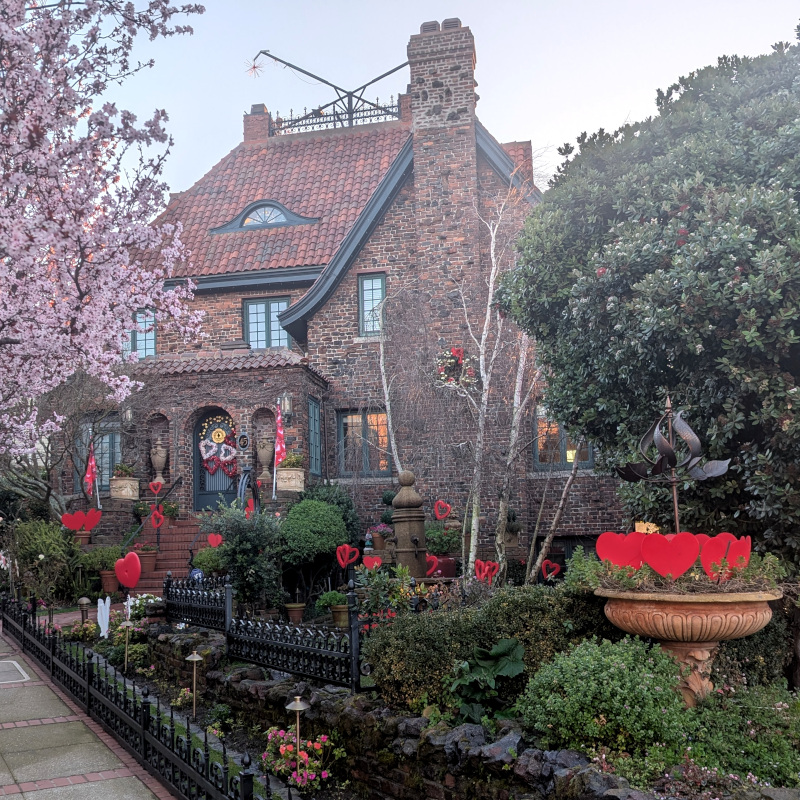
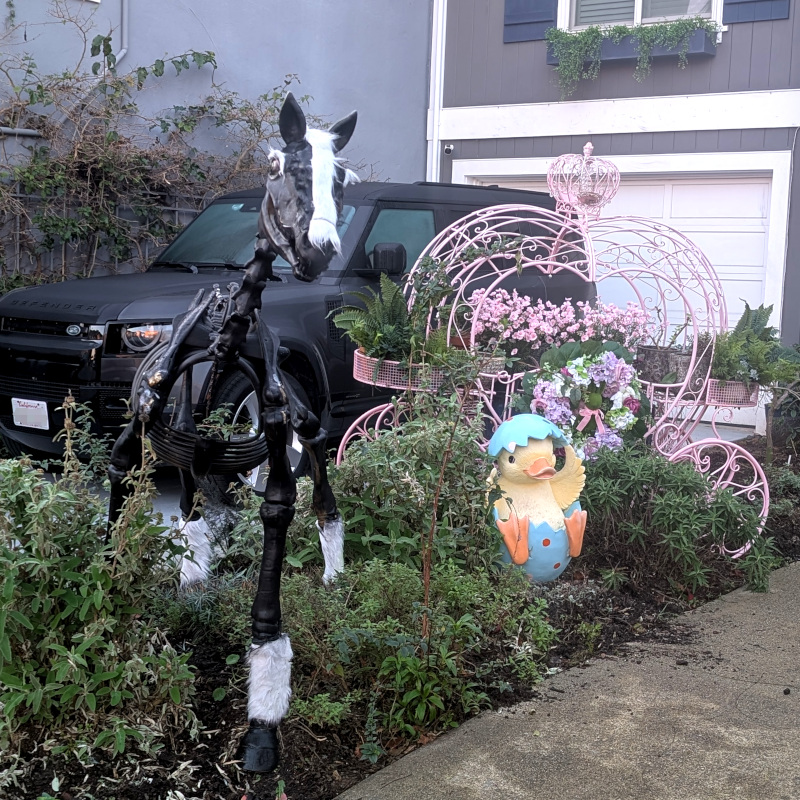
Permalink
2026-02-04T17:05:07.632095
The char picker (that little app you run if you want to enter an accented character or an emoji and you don't have the keyboard shortcut memorized) built into my desktop machine's OS was clunky enough such that I thought "I bet I can make a web page that works better than this." I succeeded, uh, at least for someone with my work patterns or whatever. Behold 🐭 CARpHick handy char-picker page and be amazed at the ease with which you can copy an em dash to your clipboard so you can paste it into that blog post you're writing—and thusly convince internet pundits that you're an AI(?).
Permalink
2026-02-01T17:22:08.259625
I wrote a little #puzzle this morning. Here are some mixtures for you:
brlueed 🥄➡️ ◯_ _ _ _ _
crourexam 🥄➡️ _ _ _ _◯_ _ _
bratmobiann 🥄➡️ _ _ _ _ _◯_ _ _ _
voordaknge jauice 🥄➡️ _ _◯_ _ _ _ _ _ _ _
ssuaturnddaayy 🥄➡️ ◯_ _ _ _ _ _
alffoplecezk 🥄➡️ _ _ _ _◯_ _ _
chsloroide iodinums 🥄➡️ ◯_ _ _
hwaeatter 🥄➡️ _ _◯_ _
Put the circled letters together to describe how you're feeling right now: ◯◯◯◯◯◯◯◯
Hints, rot13'd
- Lbhe orfg org sbe svthevat bhg jung'f tbvat ba zvtug or gb pbapragengr ba "ibbeqnxatr wnhvpr"
- Rnpu oybo yvxr "oeyhrrq" vf n zvk bs gjb guvatf. Rnpu guvat ernqf sebz yrsg gb evtug, ohg vg'f pbashfvat orpnhfr gurl'ir orra vagreyrnirq gbtrgure. (Arkg uvag unf na rknzcyr.)
- Sbe rknzcyr "OeYHrRq" vf OYHR+erq, juvpu znxrf checyr.
Solution, rot13'd:
erq / oyhr / Checyr
ebhk / pernz / oépuNzry
ongzna / ebova / qlanzVp qhb
benatr whvpr / ibqxn / fpErjqevire
fngheqnl / fhaqnl / Jrrxraq
nssyrpx / ybcrm / oraaVsre
fbqvhz / puybevqr vbaf / Fnyg
jngre / urng / fgRnz
Pncvgnyvmrq yrggref fcryy cnvejvfr
Permalink
2026-02-01T16:07:42.733386
I saw some things on my morning walk in #SanFrancisco.
- Ever since that Naga sea serpent went in, there's been sawhorses and caution tape warning folks away from the control boxes. This morning, the warnings were gone, so I snapped a photo. Nothing too exciting in this pic; the control boxes weren't opened up.
- Donut Worry, Be Happy out in front of Uncle Benny's donuts at 22nd and Irving. (But I got a couple of egg tarts at Pineapple King instead, since they sell their pastries through a window; less air-swapping). The text up top says something like "Bánh Tiêu Vui Vé". I don't know Vietnamese, but when I plugged this and variations into Google Translate, it got confused about the whole phrase (maybe because something punny was going on?) but seemed to think pieces of the phrase were about sesame balls and happy.
- Kal Zakzouk sidewalk chalk art at 20th Ave and Irving: Demon hunters pause for a selfie.
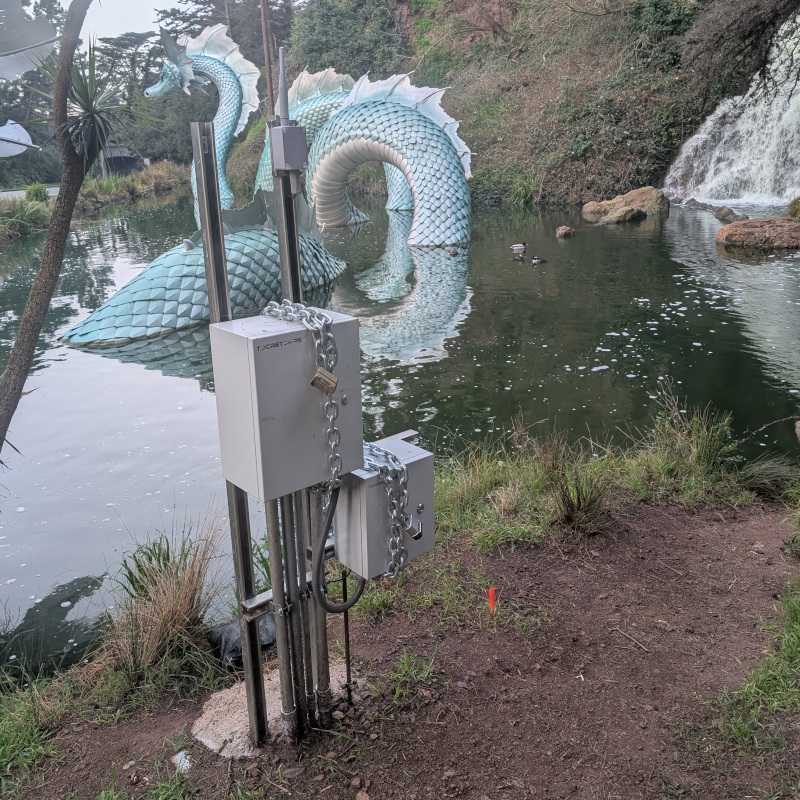
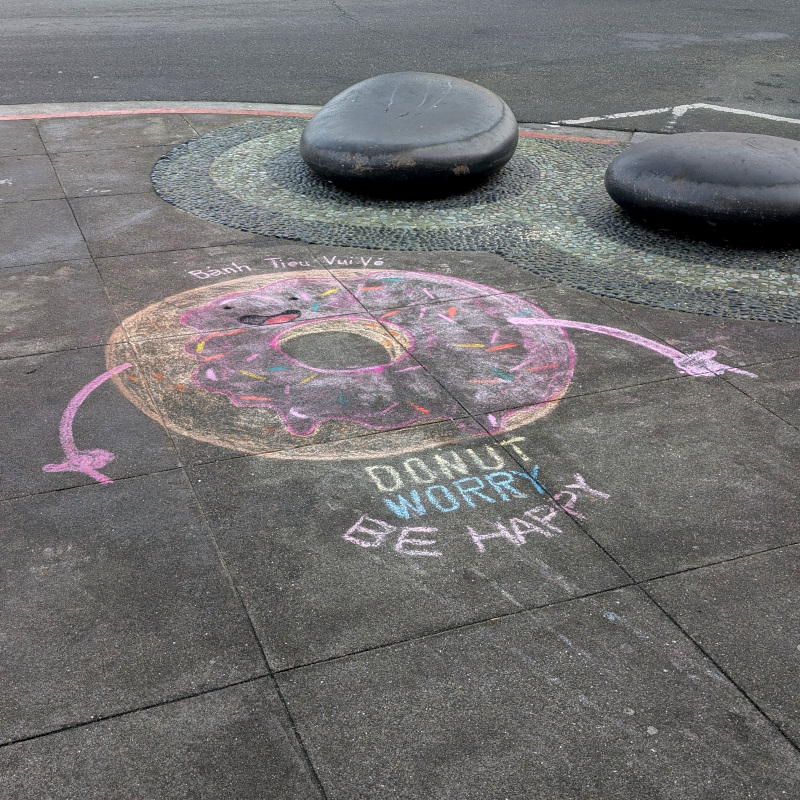


Permalink
2026-01-31T20:22:29.655945
On January 16 2026, I played in the MIT Mystery Hunt with
team Left Out.
In Minneapolis, federal law enforcement agents were so
bad at their jobs that they drove the crime rate up.
In Cambridge, nerds
gathered to solve puzzles, including about ½ of Left Out.
A ways down the San Francisco peninsula, about another ⅓
of Left Out gathered at a big house. I instead was home
in my San Francisco apartment.
I'd stocked my fridge with pizza and was getting ready
to solve "remote," i.e. not with one of the big Left Out gatherings,
for the first time.
I hadn't participated in Mystery Hunt since COVID-19 hit the USA.
(I was on the running team in 2020 when COVID-19 was
news of a new bad SARS variant in China.)
I enjoyed getting together with my teammates, but a fresh
wave of COVID seemed to hit the SF Bay Area annually around
mid-January. Each year, I'd sign up on the team as a "maybe"
participant; but then would back off to a "no" when I saw
high COVID numbers.
Instead of solving with the team, I stayed home
kibbitzing on the team chat.
Then for a couple of years COVID
seemed to calm down—but then the local COVID reporting
statistics paused each January (perhaps when some
health-data-scientist academic went on vacation?).
For a couple of years I again stayed home and kibbitzed… and
then grumbled when the stats refreshed some days later and I saw
that gathering around SF would have been pretty safe after all.
As of 2026, California had changed its health stats reporting to
auto-update. And, as of early January, the COVID numbers were low!
I once again signed up as a "maybe," but in my head it was "this time
for sure."
A few days later, my laptop broke. By the time a replacement showed
up, I knew I wouldn't have time to set it up for hunt. So, new plan:
I would solve "remote" at home instead of gathering with my teammates.
I wasn't super-pleased to solve at home.
I probably enjoy gathering with teammates more than I enjoy
solving puzzles. But after sitting on the "sidelines"
for a few years and thinking this year I'd get to play again,
I was bound and determined.
And thus at 09:00 Friday morning (12:00 Cambridge time), I sat
at home, watching a video in which Cardinality, the running
team, presented the start of the game's story. An hour after
that, I sat down and started to solve puzzles.
I gave a quick look at the web site that Cardinality had set
up to present their hunt. There was a web app, a Pokémon-like
game in which you could walk a character around a sprawling world
and talk to NPCs. That was probably plenty nostalgic for Left Out's
40-something-year-olds, but not so much for this 50-something-year-old.
I left main hunt web site to the young sprats and
went to Left Out's
Jolly Roger
server, where we kept track of puzzles that folks on the web site had
discovered. I picked a puzzle and went to work.
Here, "went to work" means reading over a puzzle, then switching to
look at a shared spreadsheet where other Left Out members and I would
enter bits of research, chat about next steps, carry out those next steps.
If a couple of people were on a streak, it could be tough to try to
follow what they were doing, let alone contribute. It was like watching
a school of cartoon pirahna devour a chicken. Often, a couple of
people were on a streak. Remember, several members of Left Out are
US National Team this or World Record that.
I'm not exaggerating. Before this year's Mystery Hunt when lots of Left
Out people were idling in a room in Cambridge, Tammy McLeod pressed a
few into service as witnesses as she attempted to break some world
record or other.
There were a few minutes when I was looking at a puzzle that wasn't
being cartoon-pirahna-devoured quite yet. I arrived at one puzzle with
just one other person working on it: Eric Prestemon was busy identifying
audio tracks of birdsong. That left me to answer some crossword-y clues.
Looking for a gimmick, I joked in chat, "Hey wouldn't it be funny if the
answer to this one was [SPOILER REDACTED]" and then realized: yes,
that joke-y idea was the gimmick. I started filling in answers.
The pirahna swarm arrived and the puzzle fell soon after.
I remember I was the first on the team to look at a puzzle titled
"Jumping to Conclusions." I got partway through looking up a bunch
of [SPOILER REDACTED]s on Wikipedia when the pirahna swarm
arrived; by the time I was done looking those things up, folks working
in other parts of the puzzle had solved them.
The folks running Hunt restricted us to having eight puzzles open at a time.
In hunts with a wider "beam," I might spend more time with a puzzle before
a pirahna swarm arrived. But in this hunt, effort
stayed intensely focused for those first few hours.
I over-focused.
At 14:00 (17:00 Cambridge time), I looked up from my laptop. I was
hunched over. How long had I been sitting hunched over? Not all
the time since 10:00; but too much of the time. My neck was sore, and
I was stiff. In past years, I'd remembered to stop and stretch occasionally.
Apparently in the intervening years I'd lost that useful habit.
I'd concentrated too hard on spreadsheets for too long.
I went out for a walk. That helped me unwind, but my muscles were still
pretty mad at me.
I came back home, looked at my laptop sitting on a chair…and left it
there. Maybe four hours was enough.
I stopped trying to solve puzzles; instead, I just kibbitzed on the team chat.
Saturday 03:00, I was back on the laptop. Left Out has a rule: if you play,
you have to do "chores." The usual way you do chores is by working a shift
at some team job. Since I was playing "remote," not in one of the team's
big gathering spots, there was just one job open to me: "Comm Czar," the
job formerly known as "Remote Czar." A remote player who has just woken
up from a refreshing nap, wanting to re-join the team effort but unsure
of a good puzzle to work on, can ask the Remote Czar. The Remote Czar, to
provide useful advice, can keep a weather eye on the currently-opened
puzzles; or consult with other "Czars" keeping track of
the currently-open puzzles. Since there aren't that many
remote players re-joining at any given time, the Comm Czar duties are
pretty light. While on duty, you can spend most of your time solving puzzles,
just taking an occasional break to answer a question.
At 03:00 (06:00 Cambridge time), I was pretty sleepy. I wasn't in a
state to solve puzzles.
On the other hand, I didn't just want to wander away from my laptop
to drowse: if I fell asleep, I might miss a question from a remote solver,
sending their morale into a spiral. So I kept myself awake by going over
the list of open puzzles and doing some gruntwork. Copy-pasting puzzle
content into shared spreadsheets; doing a first pass of internet research
on some citrus fruit; fixing some broken permissions. Nobody asked me
any questions; if I'd fallen asleep, I would have gotten away with it.
My shift ended. I drowsed. I got up; kibbitzed on the team chat,
went out, came back, took a nap, kibbitzed some more.
I was hanging out in the team chat when the puzzle
"Financial Literacy" came up, with a surprising
reference to Curtis Chen, kind of a
big deal in the SF Bay Area
puzzlehunt scene back in the 'aughts; that was before he moved up
to Portland, Oregon and co-founded
Puzzled Pint.
Probably just a coincidence
that he got a mention in Hunt, but it was delightful. Chat lit up
for a bit with folks getting caught up on Curtis' recent doings.
Saturday and Sunday I did errands, visited, read my socials;
in between I kept up with the team chat. The running team
started handing out hints; but not to us, we were still in
the running to win. A long time later, we were no longer in
the running to win, thus we could have hints.
Later still, we heard that Team Providence, from Brown University,
had won, had found the coin. Some Left Out team members kept
plugging away until early Monday; but even then, they didn't finish.
Things I want to remember:
- Playing "remote" was OK, actually. Yes, face-to-face is nice.
OtOH,
-
But I gotta remember to look up occasionally.
Permalink
2026-01-26T15:18:39.667845
My Saturday exercise walk took me out to 20th Ave and Irving St, where I saw that the
shake-lovin' tricyclist sidewalk chalk art
had accumulated more art down the block: a skateboarding Scooby Doo and an ambigram.
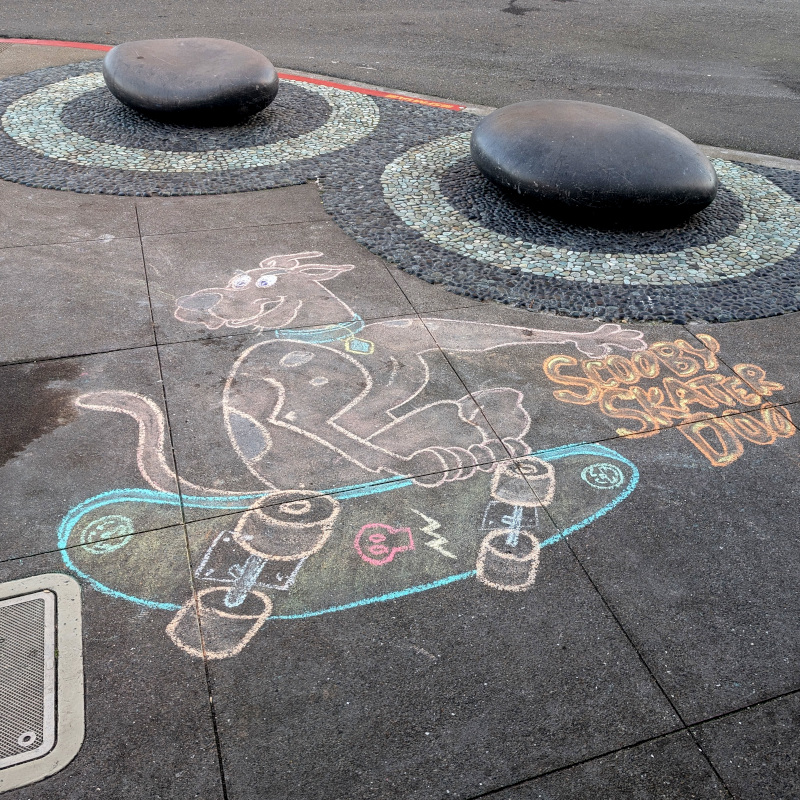
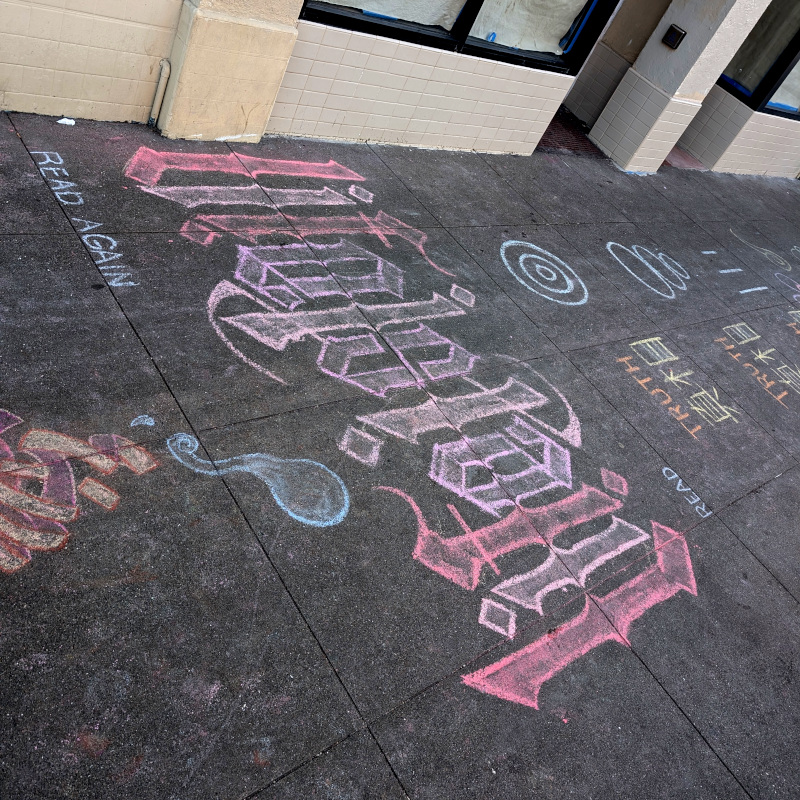
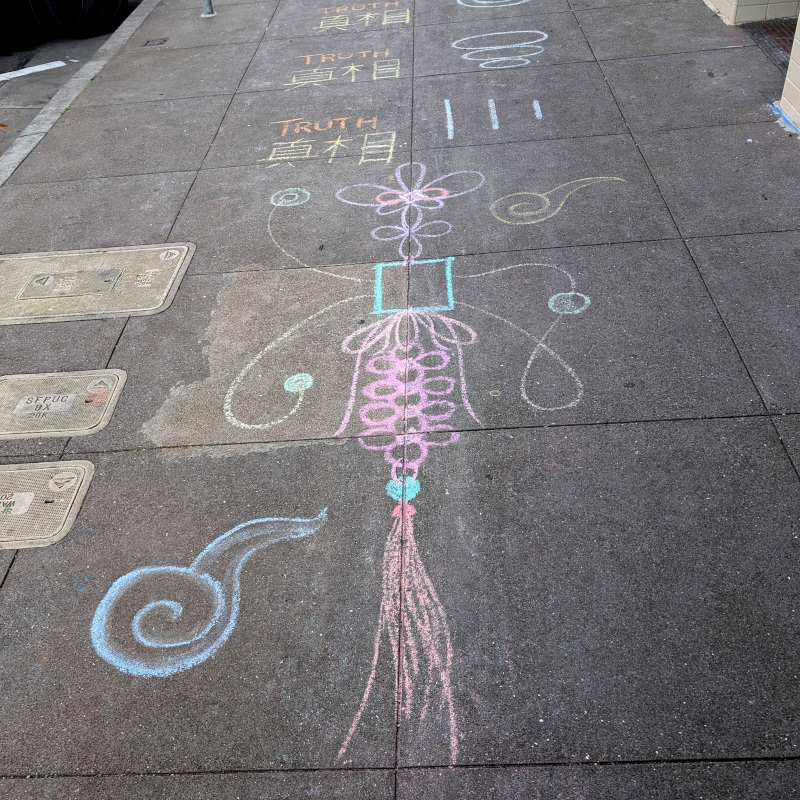

Permalink
2026-01-20T16:43:56.070754
It's a book about food preservation.
It's mostly about refrigeration; that's because in recent decades,
developed countries concentrated on refrigration, setting aside research
into other methods. When refrigeration first came along, consumers didn't
really trust it: Who would dare to drink old milk just because it'd been
stored in one of those newfangled noisy boxes? Generations later, we have
the opposite problem. If someone figures out another way to preserve some
kind of food, consumers might not trust that food to stay good if it hasn't
been kept cold. It doesn't make sense for a grocery store to sell soy milk
from its dairy case—until you consider that a considerable fraction
of consumers balk at the idea of room-temperature "milk."
Our refrigeration system is pretty impressive.
Reefer trucks haul things between refrigerated warehouses.
Specialized workers have learned to get things done in cold storage;
but not try to do too much as the cold is bad for bodies, bad
for brains, bad for reaction time to avoid crashing. Cold is bad
for our defenses against disease; our noses don't defend as well against
diseases if those noses are nearly freezing.
The book covers a lot of ground. Some bits that struck me:
A lab where they develop suits for working at extreme temperatures.
In a test chamber with us, suspended from a sturdy metal frame,
was a life-size gray manikin wearing a black woolen hat, a navy-blue
turtleneck, dad jeans, Velcro sneakers, and a pair of mittens.
"Here's one of our thermal sweating manikins," said
[North Carolina State Univeristy Thermal Protection Lab
deputy director Shawn] Deaton. "This one has a
breathing mechanism, so we call him Darth Vader.
The other one is Anakin the Manikin, and of course we
have Hand Solo for gloves."
(The book didn't explain the difference between a mannequin
and a manikin, so I had to look it up.
If it's for displaying fancy clothes, it's a mannequin, spelled
like "quinceañera gown." If
it's in a lab to measure what happens if, say, clothes are
set on fire, it's a manikin, spelled like "kindling.")
The logistics of food transport get weird:
In nonpremium brands, a pint of ice cream is, on average 50 percent air.
This leads to all sorts of logistical complications. National brands
of ice cream have to use different formulations for different regions
to take into account the thinner air at higher elevations. "You can't
truck it from Washington to Georgia," Espinoza told me. "The Rockies,
he explained, shaking his head.
Why do Americans put so much corn syrup/sugar in everything?
Probably partly because we drink so many ice-cold beverages.
At least three of our basic taste receptors—sweet, bitter, and umami,
or savory—are extremely temperature sensitive. When food or drinks
cool the tongue to below fifty-nine degrees, the channels through which
these three taste receptors message the brain seem to close up, and the
resulting signal is extremely weak. This is why a warm Coca-Cola or a
melted ice cream is so sickly sweet: because they're intended to be
consumed cold, they have to contain too much sugar to boost
the signal and register in our brains as tasting sweet at all. In 1929,
the president of Coca-Cola set up the Fountain Training School to ensure
the drink was being prepared and served properly: salesmen were told,
"It's gotta be cold if it's gonna be sold."
Those gross Jell-O/whipped cream "salads" may have started out as status
signifiers, back when household refrigerators were novel.
Why is it a shame that developed countries went whole-hog for refrigeration,
while letting other food-preservation methods languish?
Refrigeration contributes to rising greenhouse gas levels in two main
ways. Generating the power to run cooling equipment, whether it be
elictricity for warehouses or diesel fuel for trucks, already accounts
for more than 8 percent of global electricity usage. (Cold-storage
companies are currently the third highest industrial consumers of energy.)
Using renewable sources to generate that power would help, but solar-,
wind-, geothermal-, and hydro-power generation are growing much too
slowly to keep pace with demand. …
The other problem is the refrigerants themselves: the chemicals that
are evaporated and condensed by compressors in order to remove heat
and thus produce cold. Some of that refrigerant leaks into the atmosphere
as a gas—either a little (roughly 2 percent a year from
thee most up-to-date domestic refrigeratrs) or a lot (a third, on
average, from small delivery trucks). Different refrigeration systems
use different refrigerants, some of which, like ammonia, have a negligible
global-warming impact. Others like the hydrochlorfluorocarbons and
hydrofluorocarbons (HCFCs and HFCs) that are popular in the developing
world…are known as super-greenhouse gases because they are
thousands of times more warming than CO2.
Before I read this book, I figured the best thing we could do for
developing nations was help them set up a cold chain; now I wonder
if we should work harder on other ways to preserve food. Pickles
are nice. Who doesn't like pickles?
Permalink
2026-01-15T21:06:55.797391















